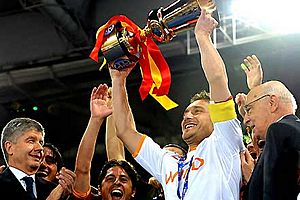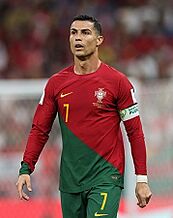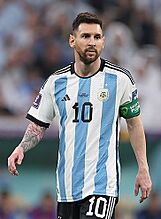Captain (association football) facts for kids
In football (also called soccer), the team captain is a special player chosen to lead the team on the field. They are often an older or more experienced player. A captain might also be someone who can really help the team or has great leadership skills. You can usually spot the captain because they wear a special armband on their arm.

Contents
What Does a Football Captain Do?
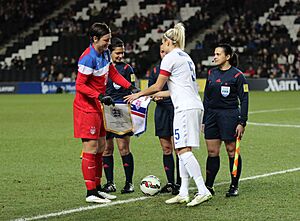
The main official job of a captain, according to the rules of football, is to take part in the coin toss before the game starts. This toss decides which team gets to kick off or which side of the field they will start on. If the game goes to a penalty shoot-out, the captain also takes part in a coin toss for that.
Even though captains don't have special power to argue with the referee's decisions, the referee might talk to the captain about how the team is behaving.
Leading the Team
Captains have many important roles beyond the official rules. They often lead their team out of the dressing room at the start of a match. If the team wins a trophy, the captain is usually the first one to lift it high. They also lead the team to collect their medals at award ceremonies.
A captain is very important for the team's spirit. If players are feeling down, the captain is often the one who encourages them and helps boost their morale. They are a rallying point for everyone.
Sometimes, especially in youth or amateur football, the captain might also help the manager decide which players will start the game. They might even take on duties that a manager would normally handle at a higher level of play.
Club Captains
A club captain is usually chosen for an entire season. If this captain isn't playing in a specific game, or has to leave the field, then another player called the vice-captain takes over their duties.
The player who is captain for a specific match is the first one to lift a trophy if the team wins. This is true even if they are not the main club captain. For example, in the 1999 UEFA Champions League Final, Peter Schmeichel was the match captain and lifted the trophy for Manchester United. The regular club captain, Roy Keane, couldn't play because he was suspended.
Some clubs might have two different captain roles. One player might be the club captain who represents the team in public. Another player might be the captain who leads the team on the field during games. For example, Gary Neville was the club captain for Manchester United for a while, but because of injuries, other players like Rio Ferdinand or Ryan Giggs often wore the armband during matches.
Vice-Captains and Other Captains
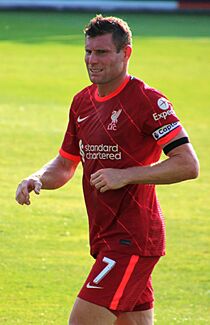
A vice-captain (also called an assistant captain) is a player who becomes the captain when the main club captain is not playing. This also happens if the captain is substituted (taken off the field) or sent off during a game. Famous examples include Marc-André ter Stegen at Barcelona and Thomas Müller at Bayern Munich.
Some football clubs even name a 3rd captain, a 4th captain, or even a 5th captain. These players step into the captain's role if both the main captain and the vice-captain are not available. For instance, Ronald Araújo has been a 3rd captain for Barcelona.
International Captains
Just like at clubs, national teams also have captains. If the main captain can't play, another player steps up. In the 1986 FIFA World Cup, when England's captain Bryan Robson was injured and vice-captain Ray Wilkins was suspended, Peter Shilton became the captain for the rest of the tournament.
During the 2010 FIFA World Cup, Germany had a similar situation. Their usual captain, Michael Ballack, was injured. So, Philipp Lahm became the captain. Later, when Lahm was ill for one game, Bastian Schweinsteiger took over the captaincy for that match. Lahm eventually became Germany's permanent captain.
Spain also had changes in captaincy during the 2020 Euro tournament. Their regular captain, Sergio Ramos, was injured. Sergio Busquets became the captain. However, when Busquets got sick, Jordi Alba stepped in as captain for some games. Busquets later returned and became the permanent captain for Spain until he retired.
See also
 In Spanish: Capitán (fútbol) para niños
In Spanish: Capitán (fútbol) para niños
 | Leon Lynch |
 | Milton P. Webster |
 | Ferdinand Smith |


